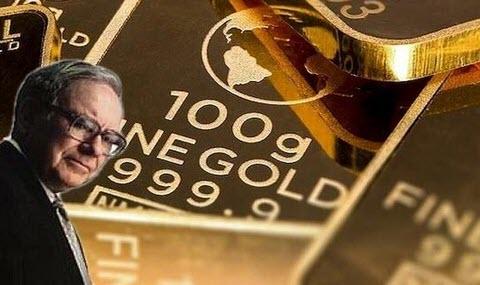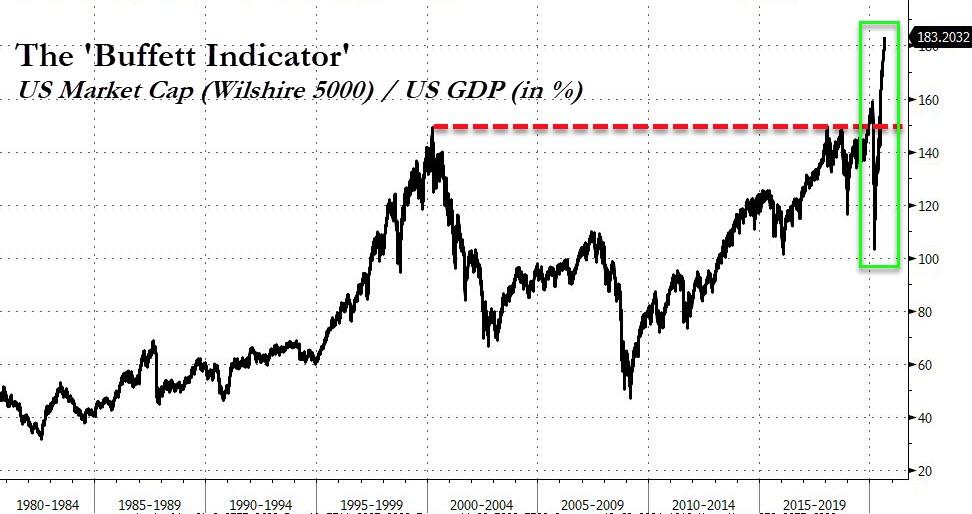Here’s Why Warren Buffett Bailed On Banks & Bought Gold In One Simple Chart
Tyler Durden
Sat, 08/29/2020 – 13:20
The headlines surrounding Berkshire Hathaway’s decision to bail on their banking exposure and buy Barrick Gold quickly faded from the mainstream media but the question of “why?” – after years of denigration for the barbarous relic – remains.
Was Buffett betting against America with a levered position on precious metals? Or was there another driver?
Perhaps, it was ‘both‘ sides of the equation – an unsustainable fiscal and monetary feudalism that can only end badly (and is building towards the endgame) – AND, as Bloomberg’s currency and rates strategist Ven Ram details below, it was the fact that – according to Buffett’s-own favorite stock market indicator – U.S. stocks are more highly valued now relative to economic output than they were even during the dotcom bubble, raising questions about the sustainability of the recent rally.
The combined market capitalization of the universe of U.S. stocks as captured by the Wilshire 5000 Index totaled $36.8 trillion as of Wednesday’s close. That amounts to 190% of the $19.4 trillion value of U.S. gross domestic product as of the second quarter.
Source: Bloomberg
The ratio eclipses the previous high reached in March 2000. After ups and downs in subsequent years, the ratio surpassed 100% in the first quarter of 2012 and pushed through successively higher levels in the following years
Applying this analysis to other U.S. indexes shows the current stock rally is lopsided and lacking in breadth. The Nasdaq 100’s market cap of about $13.5 trillion is more than two-thirds of GDP. Meanwhile, the S&P 500 Index’s aggregate market cap of $28.8 trillion comfortably eclipses the size of the economy.
Warren Buffett captured the significance of the ratio in a 2001 Fortune article, saying,
“If the percentage relationship falls to the 70% or 80% area, buying stocks is likely to work very well for you. If the ratio approaches 200% — as it did in 1999 and a part of 2000 — you are playing with fire.”
Following the dotcom bubble burst, the S&P 500 slumped 33% through 2002, while the Nasdaq 100 lost more than half its value.
The ratio’s current proximity to that 200% mark may suggest that stocks will deliver materially lower returns going forward than in the previous 10 years. That’s probably why Buffett’s Berkshire Hathaway has been relatively dormant with its acquisitions in the aftermath of the first-quarter sell-off in U.S. stocks — a sharp contrast with the period following the 2008 global financial crisis.
One caveat with the ratio is that market-cap numbers were as of the close of trading on Wednesday, while GDP is as of the end of June, which is the latest available data. That introduces a slight but ignorable lag in the percentage computation.
To be sure, while stocks may be seen as being expensive relative to the economy, there are specific reasons why investors are clamoring for them.
One of them is the paltry yields available on global sovereign bonds. With 10-year Treasuries offering just around 0.65% and G-10 bond yields falling short of 2%, the earnings yield of about 3.7% on the S&P 500 offers the biggest bang for one’s buck.
The anemic yields on Treasuries also mean that the required rate of return in the Gordon Growth Model (the “r” in D/r-g) has gone down, increasing the relative attractiveness of stocks.
Still, those factors don’t mean stocks can keep rising into perpetuity.
Counting all the gains between now and eternity, and factoring them into prices is the hallmark of a bubble. We have seen those movies before with, for instance, the dotcom exuberance. They never end well.
So America is fiscally f**ked and American stocks have never, ever, been this expensive. Seems like good reasons to buy gold… just as Warren’s dear-old-dad warned in 1948!
“I warn you that politicians of both parties will oppose the restoration of gold, although they may outwardly seemingly favor it. Unless you are willing to surrender your children and your country to galloping inflation, war and slavery, then this cause demands your support. For if human liberty is to survive in America, we must win the battle to restore honest money.“
via ZeroHedge News https://ift.tt/2ENgauy Tyler Durden

